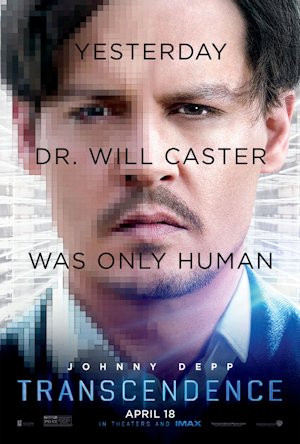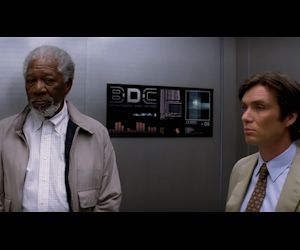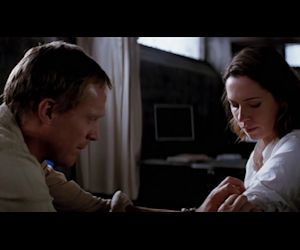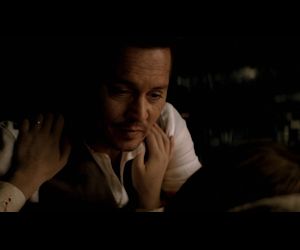Movie Review: Transcendence
 | | Transcendence |
(WARNING: This review contains major spoilers.)
Ever since Ray Kurtzweil and Vernor Verge popularized the concept of the technological singularity, science-fiction writers have tried to imagine what could happen if mankind were able to create an intelligence superior to its own. Transcendence is not the first film to tackle the subject, but it is arguably one of the more grounded. Unfortunately, while the story does a clever job of imagining what kind of situations could lead to the singularity, it gets lost in a terrorism subplot and a less provocative plot formula than the premise demands.
The ensemble cast is filled with stellar names that raise expectations--Johnny Depp, Morgan Freeman, Paul Bettany, Kate Mara, and Cillian Murphy--but all of them behave as though they are under sedation, with each actor trying to underact the next. While there is certainly something to be said for understated acting, when all of the actors are doing it, the film slogs along without truly connecting to the audience. The central relationship that drives the narrative is a loving marriage between Will Castor (Johnny Depp) and Evelyn Castor (Rebecca Hall). Unfortunately, there is little chemistry between the two and no real attempts to show what the screenplay is constantly telling us about their affection for one another.
The film's editing is similarly plodding, with even climactic action scenes moving at a relatively slow, methodical pace. The film wants to be both a ponderous science-fiction parable and a blockbuster thriller, and the resulting mess never achieves either goal. This is incredibly disappointing, because if director Wally Pfister had chosen one of these, he could have made a more notable and memorable film.
 | | No movie should be able to make Morgan Freeman and Cillian Murphy this boring |
This is because, with only a few questionable missteps, the science is pretty solid. While I don't understand how a fully-formed artifical intelligence that requires two "state-of-the-art quantum computer" cores just to run at its most basic can somehow jump over to the Internet across a tenuous satellite connection in the fraction of a second between software installation and a power outage, I give the writer, Jack Paglan, a hell of a lot of credit for understanding and conveying many difficult aspects of the artificial intelligence debate. He even throws in a few coy jokes that only science geeks will get--like the use of "Turing" as a pseudonym--as well as dabbling in other fields like nanotechnology and neuroscience. The story, for example, shows us a mild version of what futurists call the "grey goo" problem, something I can't recall ever seeing in a movie before.
Unfortunately, all of this hard work is unraveled by the forced happy ending. Our heroes, most notably Dr. Max Waters (Paul Bettany), find themselves in the unenviable position of trying to stop the singularity after it has already begun. The two major problems I have with this are the implicit assumption that a supreme artificial intelligence would inevitably be hostile to humanity and that a handful of humans can outsmart something they have already described as being smarter than "the collective intelligence of every human who has ever lived."
 | | Yes, he injects a computer virus into her bloodstream that the most intelligent thing that has ever existed can't overcome when it uploads the electrical signals in her brain, which is the dumbest abuse of a computer virus since Independence Day |
This leads to laughably absurd conceits like the one in which the A.I. explains it can't multitask saving someone's life while uploading a "virus" (which shouldn't logically work, incidentally). The climax involves the A.I. taking control of nanomachines that have covered the landscape, but instead of building super-powerful materials that could withstand an assault, it just flips a car and rebuilds some solar panels.
Worse yet, the movie shows us at the start how it's all going to end, stripping the climax of its suspense. There could have been a way to show us a post-technological future without showing us which characters are going to live and which are going to die and without making it abundantly clear that the A.I. is going to lose in the end. The only good thing I will say about the opening scene is that it prepares you for the film's main flaw: it gives us a standard Hollywood trope instead of logically following through on its premise.
The film isn't a total waste, though. The effects are quite good, especially late in the film, as the singularity amps up with nanotechnology. The core philosophical debate--if you transfer all the electrical signals from somebody's brain into a machine, is the resulting program a human intelligence or merely a copy?--is dealt with incredibly well. Even though the chemistry between the actors is lacking, the motivation for Evelyn to have complete faith in the A.I. being her dead husband is totally relatable and believable, as is Dr. Waters' resistance to the same belief.
 | | If only the super-intelligent A.I. had thought to take a minute to explain its plan to the one woman who trusted it... |
Unfortunately, making Dr. Waters the sole voice of reason (Morgan Freeman's Dr. Tagger joins him when the problem becomes more obvious) is a tiresome Hollywood portrayal of the scientific community as a bunch of careless zealots who aren't concerned with ethics or consequences. This is probably necessary, since this is a story that follows the Frankenstein model of science-fiction, where some new technology runs amok. While the film tries in the end to explain that the A.I. isn't really hostile--that it is trying to heal the planet and that it is just misunderstood--this opens up a host of plot holes, such as why the A.I. doesn't explain this to Evelyn or anybody else at any point before the end. For something that is supposed to be so smart, the A.I. seems wholly unable to foresee the obvious obstacles in its path.
Transcendence, then, is an immensely frustrating movie. For everything it does well, it does two things poorly. Its premise is much smarter and more well-researched than ninety-nine percent of the science-fiction on the big screen, but what it does with that premise is cliché to the point of insulting the audience's intelligence. How a story can be so clever and so insipid at the same time is almost beyond comprehension, but you don't need to be a supercomputer to know that a great idea can get ruined by Hollywood.
FINAL SCORE:





Despite good scientific grounding, this is a slow movie with weak acting and a conclusion that utterly fails to live up to its premise.
|
-e. magill 8/26/2014
|
|